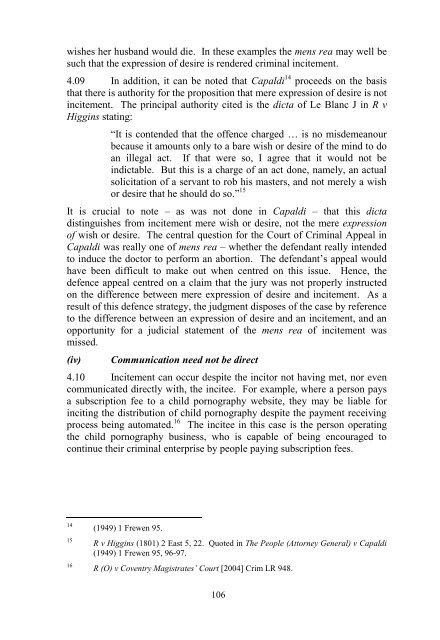Consultation Paper on Inchoate Offences - Law Reform Commission
Consultation Paper on Inchoate Offences - Law Reform Commission
Consultation Paper on Inchoate Offences - Law Reform Commission
Create successful ePaper yourself
Turn your PDF publications into a flip-book with our unique Google optimized e-Paper software.
wishes her husband would die. In these examples the mens rea may well besuch that the expressi<strong>on</strong> of desire is rendered criminal incitement.4.09 In additi<strong>on</strong>, it can be noted that Capaldi 14 proceeds <strong>on</strong> the basisthat there is authority for the propositi<strong>on</strong> that mere expressi<strong>on</strong> of desire is notincitement. The principal authority cited is the dicta of Le Blanc J in R vHiggins stating:“It is c<strong>on</strong>tended that the offence charged … is no misdemeanourbecause it amounts <strong>on</strong>ly to a bare wish or desire of the mind to doan illegal act. If that were so, I agree that it would not beindictable. But this is a charge of an act d<strong>on</strong>e, namely, an actualsolicitati<strong>on</strong> of a servant to rob his masters, and not merely a wishor desire that he should do so.” 15It is crucial to note – as was not d<strong>on</strong>e in Capaldi – that this dictadistinguishes from incitement mere wish or desire, not the mere expressi<strong>on</strong>of wish or desire. The central questi<strong>on</strong> for the Court of Criminal Appeal inCapaldi was really <strong>on</strong>e of mens rea – whether the defendant really intendedto induce the doctor to perform an aborti<strong>on</strong>. The defendant‟s appeal wouldhave been difficult to make out when centred <strong>on</strong> this issue. Hence, thedefence appeal centred <strong>on</strong> a claim that the jury was not properly instructed<strong>on</strong> the difference between mere expressi<strong>on</strong> of desire and incitement. As aresult of this defence strategy, the judgment disposes of the case by referenceto the difference between an expressi<strong>on</strong> of desire and an incitement, and anopportunity for a judicial statement of the mens rea of incitement wasmissed.(iv)Communicati<strong>on</strong> need not be direct4.10 Incitement can occur despite the incitor not having met, nor evencommunicated directly with, the incitee. For example, where a pers<strong>on</strong> paysa subscripti<strong>on</strong> fee to a child pornography website, they may be liable forinciting the distributi<strong>on</strong> of child pornography despite the payment receivingprocess being automated. 16 The incitee in this case is the pers<strong>on</strong> operatingthe child pornography business, who is capable of being encouraged toc<strong>on</strong>tinue their criminal enterprise by people paying subscripti<strong>on</strong> fees.141516(1949) 1 Frewen 95.R v Higgins (1801) 2 East 5, 22. Quoted in The People (Attorney General) v Capaldi(1949) 1 Frewen 95, 96-97.R (O) v Coventry Magistrates’ Court [2004] Crim LR 948.106
















